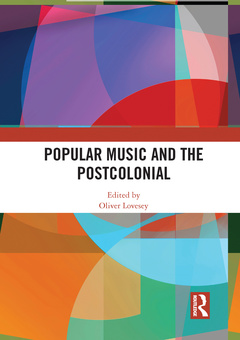Popular Music and the Postcolonial
Coordonnateur : Lovesey Oliver

Popular Music and the Postcolonial addresses the often-overlooked relationship between the fields of popular music and postcolonial studies, and it has implications for ethnomusicology, cultural and literary studies, history, sociology, and political economy. Popular music in its many forms exploded in popularity, following developments in sound technology and shifting population demographics, in the 1960s, the era of radical agitation against empires in the global south but also within the very heart of Europe. Popular music aided in fostering and documenting such resistance to violent oppression and in liberating the hearts and minds of the colonized. This collection offers a timely intervention in this field, showing popular music?s role in defining or undermining certain colonial and postcolonial nations, in expanding and complicating the domain of postcolonial theorists?including the "founder" of postcolonial studies Edward Said?and in decolonizing the ears of its diverse, sometimes antagonistic, audiences.
This book was originally published as a special issue of Popular Music and Society.
Introduction - Decolonizing the Ear: Introduction to ‘Popular Music and the Postcolonial’1. Song for a King’s Exile: Royalism and Popular Music in Postcolonial Uganda2. Popular Songs and Resistance: Ngũgĩ wa Thiong’o’s Maitũ Njugĩra 3. Popular Music and the Young Postcolonial State of Cameroon, 1960–19804. Edward Said on Popular Music5. Occitan Music Revitalization as Radical Cultural Activism: From Postcolonial Regionalism to Altermondialisation6. Irish Republican Music and (Post)colonial Schizophrenia7. Rapping Postcoloniality: Akala’s "The Thieves Banquet" and Neocolonial Critique8. Decolonizing Korean Popular Music: The "Japanese Color" Dispute over Trot
Oliver Lovesey is a Professor of English at the University of British Columbia-Okanagan, Kelowna, Canada. His most recent publications include The Postcolonial Intellectual (2015) and Postcolonial George Eliot (2017), as well as essays on popular music in Musical Quarterly, Popular Music, Popular Music and Society, and Rock Music Studies.
Date de parution : 06-2020
17.4x24.6 cm
Date de parution : 08-2018
17.4x24.6 cm
Thème de Popular Music and the Postcolonial :
Mots-clés :
Young Men; National Library; ethnomusicology; Postcolonial Cameroon; Popular Music and Society; Provisional IRA; Edward Said; IRA Volunteer; musicology; France’s Colonial Legacy; postcolonial studies; pan-African Education; popular music; Radical Cultural Activism; cultural decolonization; Yinka Shonibare; postcolonialism; Postcolonial Korea; David Pier; Gĩchingiri Ndĩgĩrĩgĩ; Irish Rebel Songs; Anja Brunner; European Classical Music; Wouter Capitain; Arab Popular Music; Virginie Magnat; Korean Popular Music; Stephen R; Millar; Japanese Color; Justin A; Williams; Ethnic Musical Traditions; Seung-Ah Lee; United States Army Military Government; Manu Dibango; Golden Sounds; Occitan Language; Minor Pentatonic Scale; Musical Elaborations; Umm Kulthum; Nonclassical Musics



